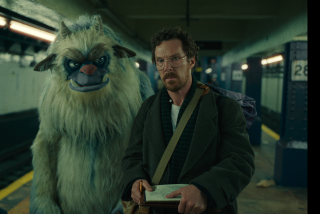
Boris is not shy, but he is a bit prickly. He enjoys being the center of attention and squeals with indignation if anyone tries to remove him from the limelight. He loves bananas and his large, porcine nose wriggles with contentment as he bites into one.
A group of artists, designers and fabricators surround Boris on a recent Friday at Jim Henson’s Creature Shop in Burbank.
“What color is his tongue?” one asks, leaning in to observe the lithe muscle as it darts out of his diminutive mouth for a taste of fruit.
Another studies his whiskers, marveling at the way they cover his velvety muzzle.
Boris is not an unfortunate male model for an uncouth new Muppet, he is a 21-year-old Brazilian porcupine — a visiting ambassador to the legendary puppet-making shop as it works to build what might be the world’s largest animal puppet, most certainly the largest porcupine puppet. (The puppet has been submitted for certification to the Guinness Book of World Records.)
Named Percy the Porcupine, the two-story creation is covered in 2,000 foam quills and has an articulated nose the size of a 2-ton Volkswagen. And that’s just the arboreal animal’s head. The five fabricators who spent more than 1,000 hours meticulously constructing the fantastical creature decided to leave the body out of the equation.
With a 40-foot circumference, it’s Percy’s cranium — which will be operated by five performers pulling various strings to open and close his orb-like eyes, move his maw and pull his face back and forth — that will bring joy to the children the puppet was built to entertain.
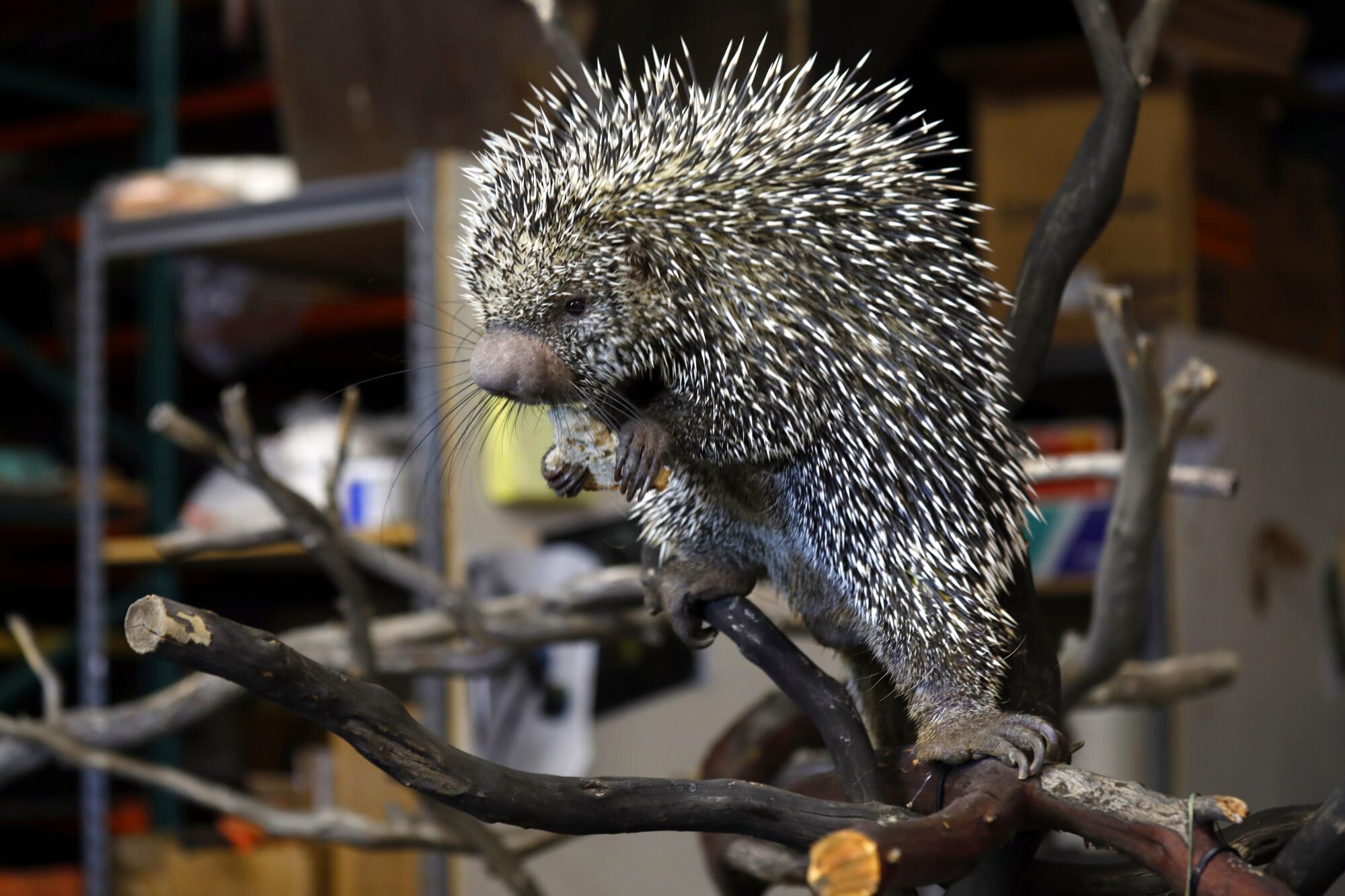
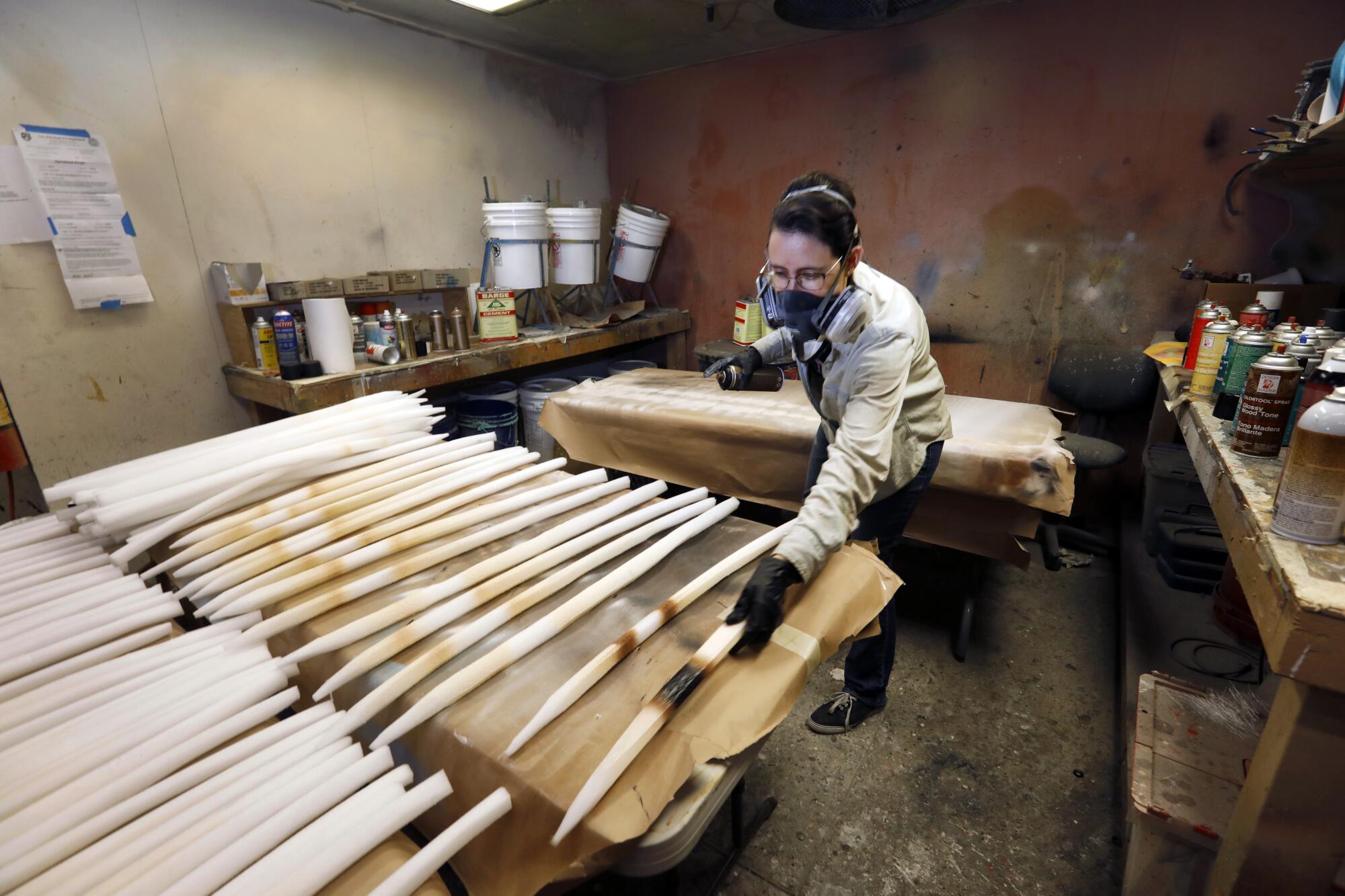
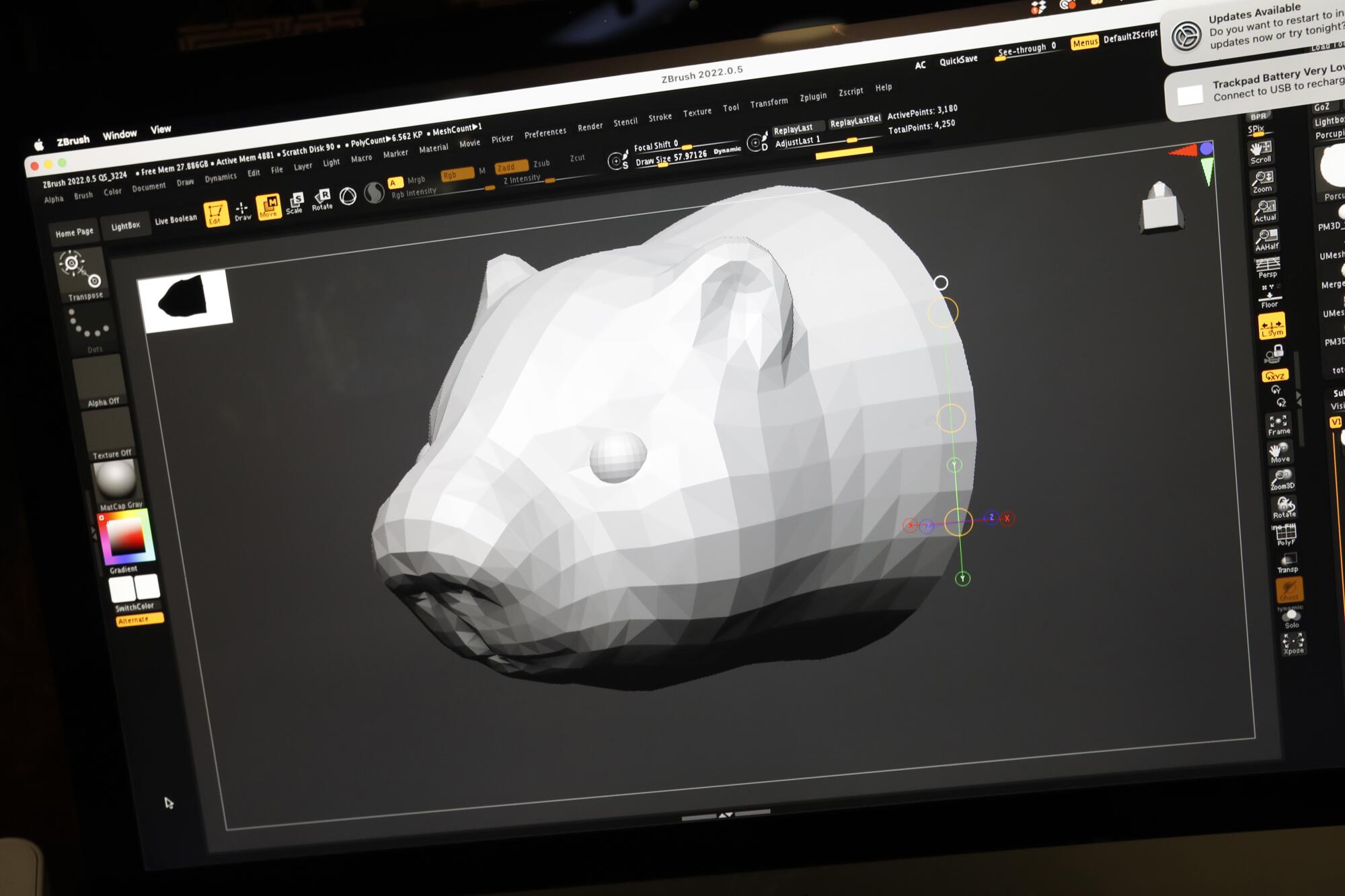
The San Diego Zoo commissioned Percy over the holidays in celebration of the grand opening of a new 3.2-acre attraction called Wildlife Explorers Basecamp, which will welcome families beginning March 11.
Wildlife Explorers Basecamp cost more than $88 million to build and features four interactive habitat zones: Desert Dunes, Wild Woods, Marsh Meadows and Rainforest. Each area doubles as a natural play space where kids are encouraged to get up close and personal with a variety of animals, including porcupines, sloths, salamanders and butterflies via nature-themed pathways, bridges, tunnels, spiral staircases, waterways and climbing structures.
“Our goal is to inspire the youth of the world,” says San Diego Zoo wildlife ambassador Marco Wendt, who stands in a conference room beside a small 3-D-printed foam model of Percy’s head that was made to ensure the patterns created for the giant puppet were accurate. “Jim Henson’s Creature Shop does the same. So it’s the perfect collaboration.”
Wendt shares that his parents are from Mexico, and that as a first-generation American, he learned English in part from cartoons and Jim Henson movies.
Peter Brooke, creative supervisor for the Creature Shop, smiles broadly beneath his face mask as Wendt talks.
“The reason we said ‘yes’ is that we’ve never had such a challenge,” says Brooke. “It could’ve been simple but ‘no,’ they decided on a porcupine.”
On this warm day in mid-February, Percy is still a work in progress. Boris, meanwhile, sits on a tree branch in front of the puppet, clearly relishing his flesh-and-blood superiority.
Fabricators, including Tina Roland, labor on Percy’s 2,000 quills, which are hand carved out of pool-noodle-like foam using a variety of sharp knives, box cutters and razors. It will take more than 10 gallons of paint to give all of the quills their signature brown stripes.
“I did get the process down to a minute-and-a-half for each quill,” says Roland, who uses barge glue (the kind you’d find at a cobbler shop for repairing soles) to attach the quills to Percy’s head. “But that was after a lot of practice, and it doesn’t include painting.”
Her secret for success when tasked with such repetitive work? “A lot of podcasts,” she says, laughing.
Fabrication supervisor and lead designer Scott Johnson first created the patterns for Percy using a stock photo and a computer program for digital sculpting called ZBrush. The patterns were sent off to a company that turned them into sewing patterns for Percy’s giant head, which was stitched together from inflatable canvas (the kind you’d find on a hot air balloon).
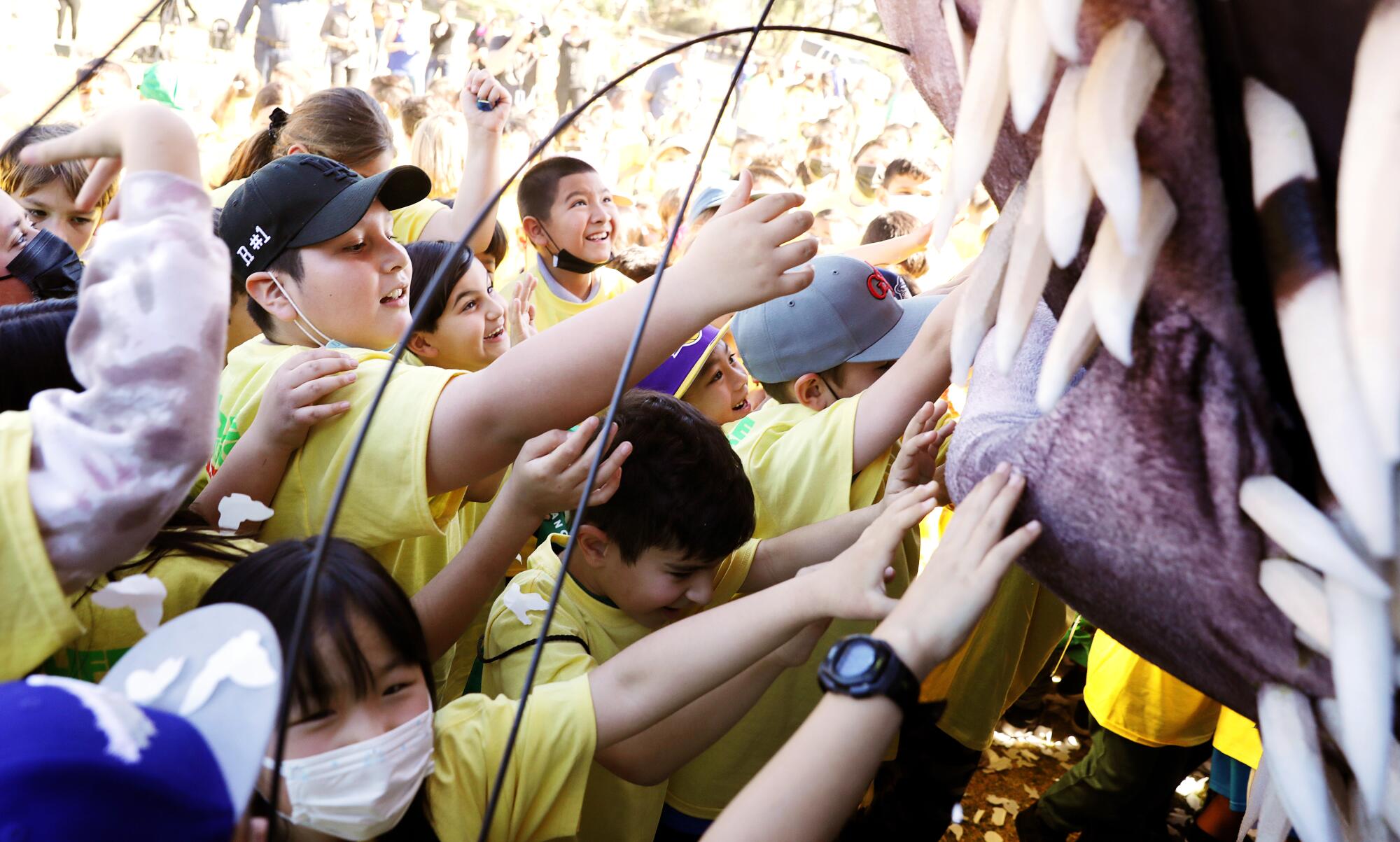
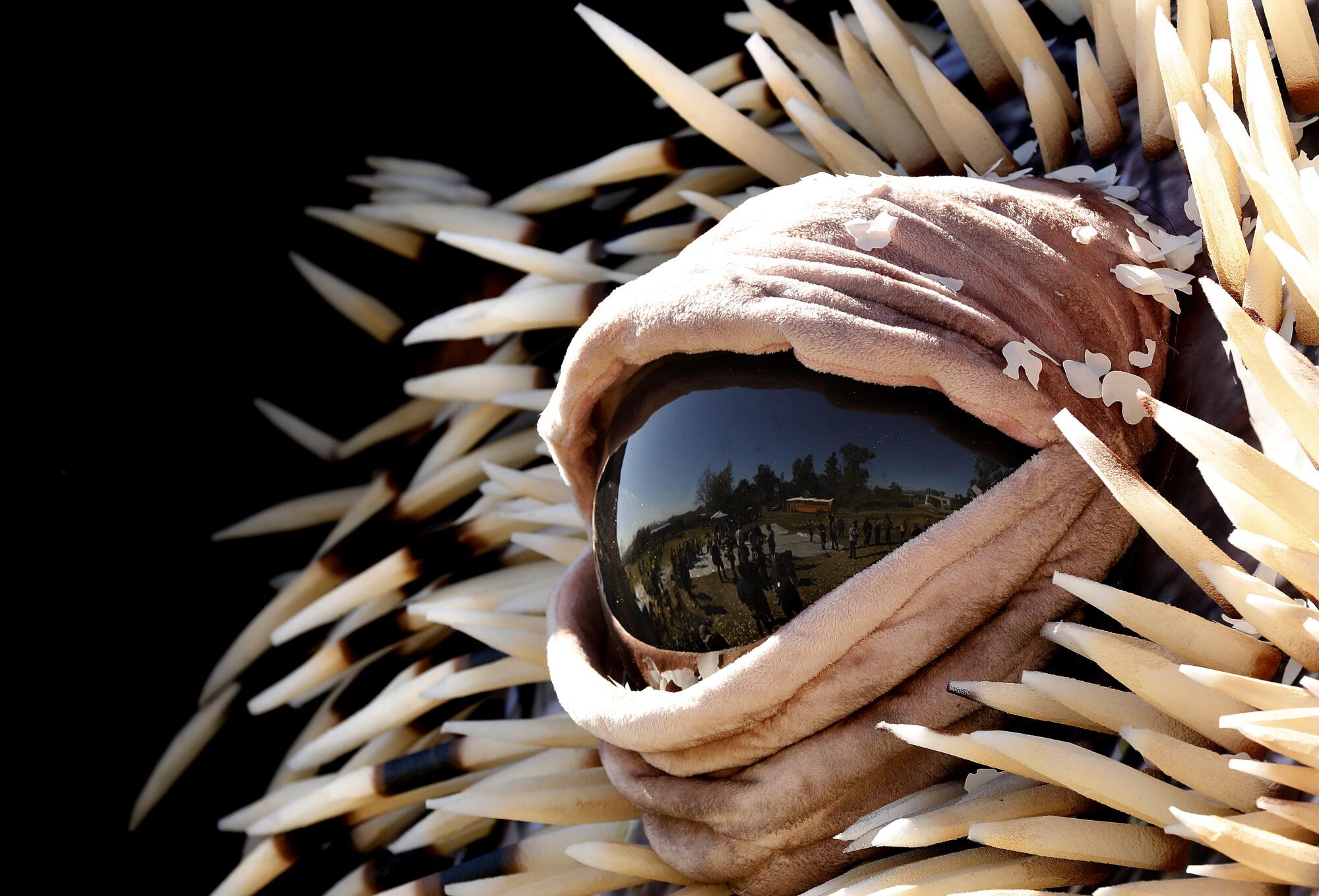
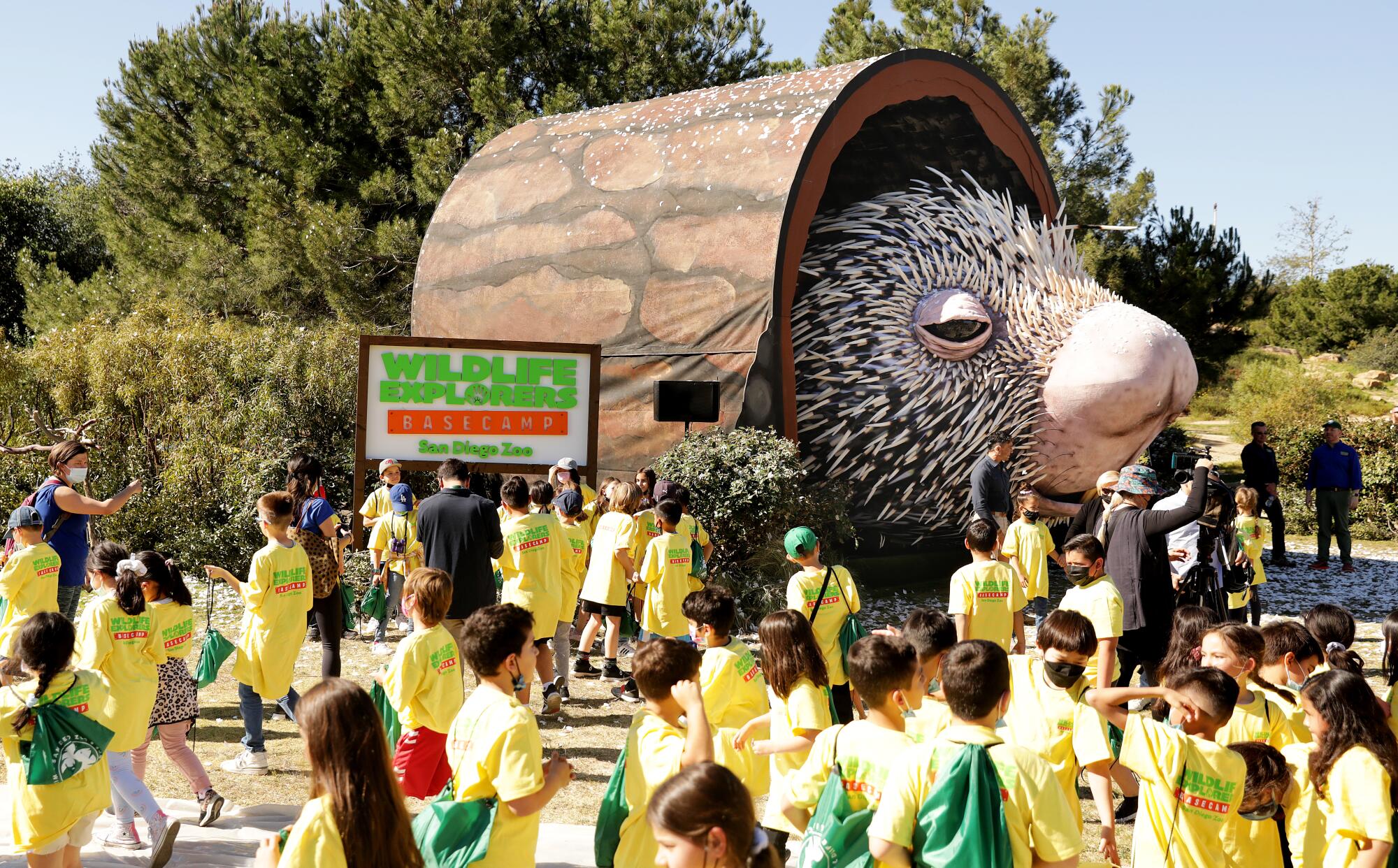
Percy is made large using air blown by a loud generator through a seam at the back of his head. Creators realized this was the only reasonable solution to the problem of the puppet’s portability. Percy was set to debut for schoolkids in L.A.’s Elysian Park before making the trip to San Diego, where he can be inflated for a variety of Basecamp-related special events.
“Photos are printed on the canvas, and that gives us a base to work with,” says Brooke, explaining that the acrylic hemisphere eyes and fabric muzzle were attached to the inflatable base using Velcro and D-rings.
Percy’s whiskers are made from a thick monofilament, like fishing line, says Brooke. Those are punched into the muzzle and pulled through. The tongue, which fabricators have identified as pink thanks to Boris, ends up being made from a piece of foam, as do the two beaver-esque front teeth.
The last step, says Johnson, is a thorough airbrush job to add all the detailed lifelike colors and textures to Percy’s final look.
A few hectic weeks later, Percy is ready for his coming-out party. Dozens of eager elementary kids from schools around the city sit on the grass in Elysian Fields with a stunning view of downtown L.A. behind them. They wear bright yellow Wildlife Explorers Basecamp T-shirts, and focus their eyes on a giant log.
After some inspirational words from San Diego Zoo reps, the kids count backward from five and Percy zooms out from inside the log, his giant head bouncing and bobbing, his liquid-brown eyes blinking beneficently. Rice paper confetti shoots from two air rockets on either side, strains of “Going to the Zoo” by children’s folk singer Raffi blast from speakers, and the kids swarm the massive puppet.
They scream, squeal and cheer, petting his super-soft snout and pulling on his fabulous quills.
“It’s a success; we’re happy,” says Brooke, proudly observing the kid chaos. “It really worked!”
If inspiring a sense of awe in children can be considered a measure of success, then Percy may have ascended to the pinnacle.
Two 8-year-old girls, Emily Narozhna and Angelina Galstian, giggle nearby. The best friends share the same class at Glenoaks Elementary School and they think Percy is pretty fantastic.
“Uh, it was a puppet?” says Narozhna. “I thought it was a real creature!”
“Yeah!” agrees Galstian. “It looks so real! I’ve never seen a puppet like that.”
The girls grin and Narozhna does a quick handstand. They share a secret look. They know better, but playing make-believe is much more fun.
More to Read
The biggest entertainment stories
Get our big stories about Hollywood, film, television, music, arts, culture and more right in your inbox as soon as they publish.
You may occasionally receive promotional content from the Los Angeles Times.


